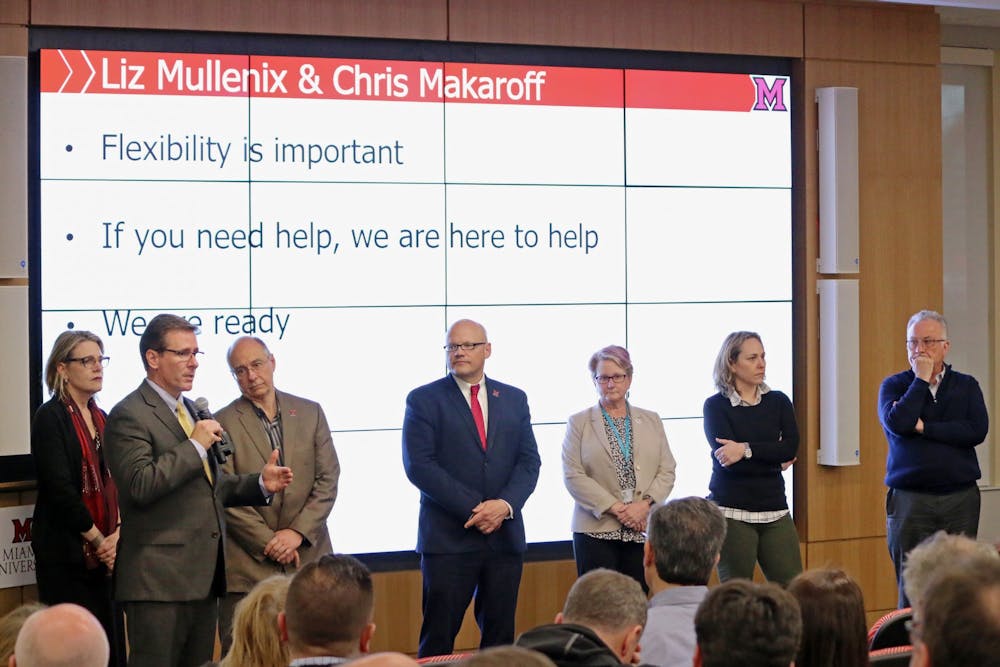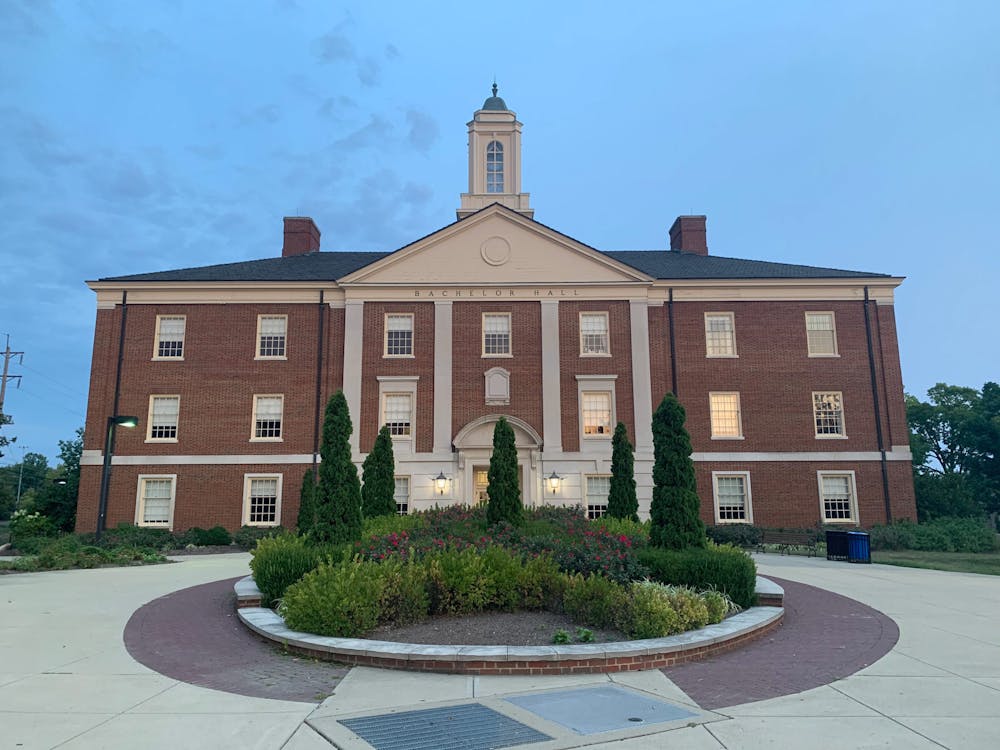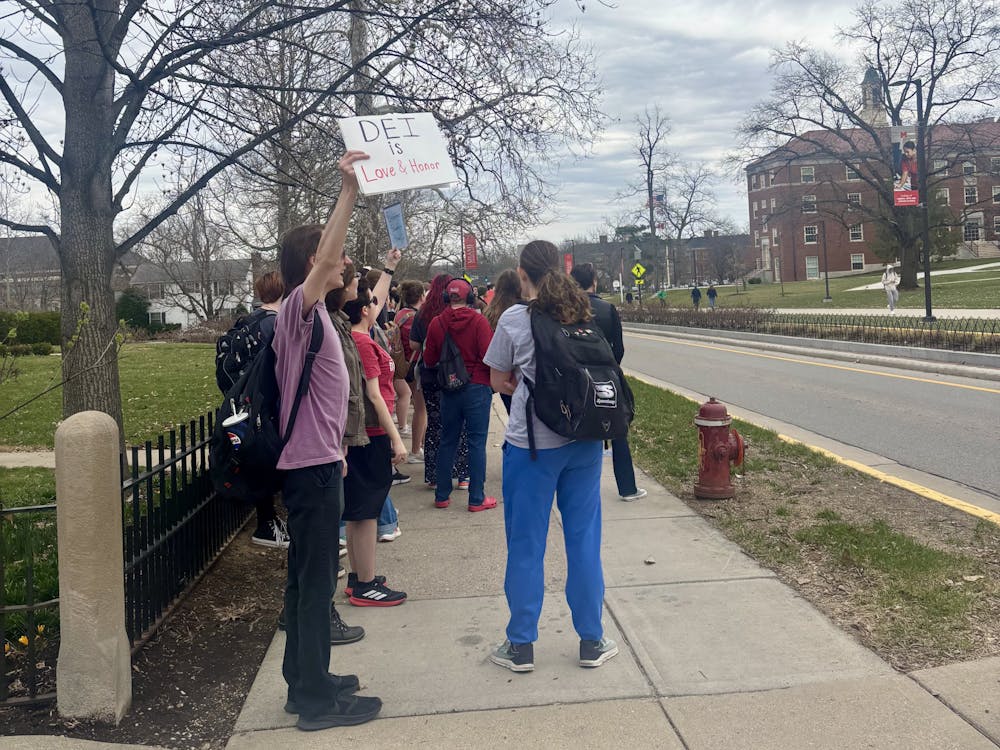Miami University President Greg Crawford announced Tuesday that Miami classes will be moved online effective Wednesday until at least Sunday, April 12.
Tuesday afternoon, Ohio Governor Mike DeWine asked state universities to transfer to “remote learning” due to the novel coronavirus. This comes after his administration announced there are three confirmed cases of the novel coronavirus in Cuyahoga County yesterday.
Crawford sent an email to the student body on Tuesday afternoon announcing the cancelation of in-person classes and the move to online courses. This was followed by a faculty assembly, where Crawford and other university leaders spoke about the university's plans moving forward.
“We recognize these measures may cause disruption to many but the risk of not acting outweighs the disruption,” Crawford wrote.
During the faculty assembly, University Provost Jason Osborne emphasized that Miami remains open.
“We are not closing. We are not canceling classes,” Osborne said.
Residence halls, dining halls and campus services will remain open.
Osborne said all classes will operate through Canvas. Professors may use video conference platforms such as WebEx, but classes will not necessarily meet virtually at their regular class times. Canvas is currently working to ensure the bandwidth will allow professors to adequately upload large files, like videos of lectures.
“We have to be able to continue the educational operations of the university,” Osborne said.
Miami is still evaluating what to do about laboratory, studio and performance-based classes and will provide guidance to professors and departments later this week. Small labs can continue to meet as usual, but it is recommended that labs figure out a way to meet remotely. Any student who does not feel comfortable coming to any university-sanctioned event, whether it be a class, lab or one-on-one meeting, is not required to attend. Professors have an obligation to provide all mandatory materials remotely.
Students in majors with clinicals or student teaching should work with their job placement to determine if they should continue reporting to work, said Chris Makaroff, dean of the College of Arts and Science.
The university is working to evaluate how to best support students who choose to go home, said Dean of Students Kimberly Moore. The Rinella Learning Center is working on how to deliver remote tutoring services, and the Miller Center for Student Disability Services will work with professors to ensure courses remain accessible.
Enjoy what you're reading?
Signup for our newsletter
Student employees will be allowed to work “to the extent that they want,” said David Creamer, senior vice president for finance and business services. Dining hall services may be limited as students go home, officials said. Student employees who do choose to go home will not be compensated in any additional way.
For the time being, staff and faculty will be expected to report to work as normal, Creamer said. In the future, the university may consider asking them to work remotely. The university will make a decision on this later this week or early next week, Creamer said.
The university plans to cancel “non-essential student gatherings,” but will let student organizations decide whether to meet on their own. It is recommended people stay six feet away from one another to prevent the spread of the virus, which is a practice referred to as social distancing. For now, all gatherings of more than 150 people will be canceled.
Assistant Vice President for Student Life - Health and Wellness Steve Large, said he will be speaking to one of the main Oxford bar owners Tuesday night. Creamer, Miami’s general counsel Robin Parker and Executive Assistant to the President Ted Pickerill are speaking with Oxford city officials tomorrow. Because the establishments Uptown are privately-owned, Miami cannot do anything directly to curtail student gatherings in those spaces, but will urge the city to increase police patrols. Miami plans to increase MUPD patrols on campus, given how much more “free time” students will have in addition to next week’s upcoming Green Beer Day festivities, Creamer said.
All university-sponsored programs abroad have been canceled for spring break. Those who choose to travel abroad on their own need to be screened by Student Health Services upon returning to the university, per DeWine’s recommendation.
Parker encouraged students to “seriously weigh” the risks and benefits before deciding to travel during spring break. Although a country might not be listed as a Level 2 or 3 when students leave for spring break, that might change before students come home.
Miami will set aside rooms for students living in residence halls to be quarantined, but students who travel abroad will be asked to self-quarantine at home for 14 days, the coronavirus incubation period, before returning to campus, Parker said.
Anyone traveling abroad is asked to register by emailing travel@miamioh.edu with details about where they are going, the length of stay and ports of exit and entry.
International students on visas will not be affected due to a workaround offered by the federal government in light of coronavirus, and nonstandard online courses will not affect their visa status, Osborne said.
Creamer said if there is a spike in students requesting to stay in residence halls for spring break, the fee, which students typically pay per day to stay over break, will be “relaxed.”
Although there is not any legislation mandating the recommendations of the state, many universities are canceling on-campus education at least through the month of March, including the Ohio State University, Kent State University and the University of Toledo.
Dewine also strongly discouraged the congregation of “more than 25 people indoors,” in order to prevent the spread of the virus. This includes many sporting events such as the upcoming NCAA March Madness tournament. DeWine cited concerns for the spectators who attend, and the people those spectators may interact with afterwards. The Mid-American Conference will issue a determination as to whether or not Miami Athletics teams will continue to play and travel as normal.
Jenny Bailer, Butler County’s health commissioner, said this all came suddenly, and the university will continue to evaluate how to move forward.
“Today is today, and tomorrow will be different,” she said.




